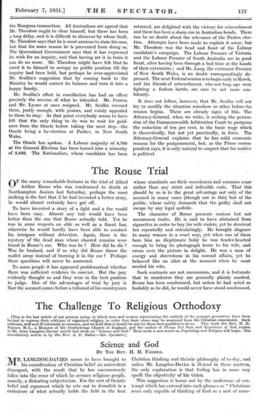The Rouse Trial
OF the many remarkable features in the trial of Alfred Arthur Rouse who was condemned to death at Northampton Assizes last Saturday, perhaps the most striking is the fact that if he had invented a better story, he would almost certainly have got off.
To have invented a story of a fight and a fire would have been easy. Almost any tale would have been better than the one that Rouse actually told. Yet he was in some respects an able as well as a fluent liar, otherwise he would hardly have been able to conduct his intrigues without detection. Again, there is the mystery of the dead man whose charred remains were found in Rouse's car. Who was he ? How did he die ? Was he brained, and if so why did Rouse throw the mallet away instead of burning it in the car ? Perhaps these questions will never be answered.
To some people it has appeared problematical whether there was _sufficient evidence to convict. But the jury evidently thought so and they were in the best position to judge. One of the advantages of trial by jury is that the accused comes before a tribunal of his countrymen whose standards are their consciences and common sense rather than any strict and inflexible code. That this should be so is to the great advantage not only of the accused in many cases (though not in this) but of the public, whose safety demands that the guilty shall not escape by any legal quibble.
The character of Rouse presents , curious but not uncommon traits. He is said to have abstained from cigarettes in order to buy his wife violets, yet he deceived her repeatedly and calculatingly. He brought disgrace to many women in a cruel way, yet when one of them bore him an illegitimate baby he was tender-hearted enough to bring its photograph home to his wife, and croon over the picture in delight. He was a man of energy and shrewdness in his normal affairs, yet he behaved like an idiot at the moment when he most needed his wits.
Such contrasts are not uncommon, and it is fortunate that in murderers they are generally plainly marked. Rouse has been condemned, but unless he had acted as foolishly as he did, he would never have stood condemned.










































 Previous page
Previous page